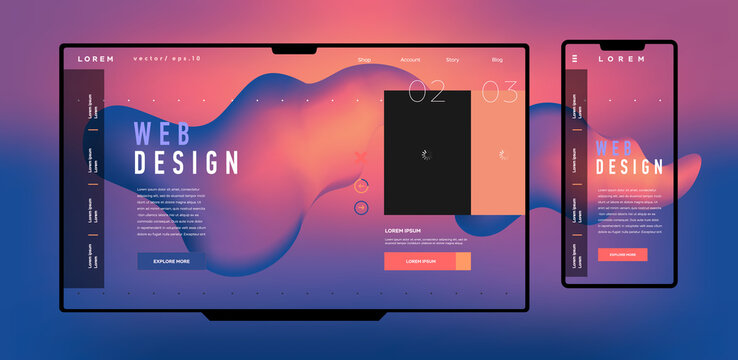Exploring the Crucial Components of Reliable Web Layout for Improved Customer Experience and Engagement
In the swiftly progressing electronic landscape, the value of efficient web layout can not be overemphasized, specifically relating to individual experience and involvement. As we examine these essential aspects, it becomes noticeable that the interplay in between design choices and customer habits warrants further exploration to discover how these approaches add to an absolutely interesting on the internet setting.
Importance of User-Centric Layout
As individuals significantly browse a digital landscape full of diverse alternatives, the value of user-centric style ends up being extremely important. This method prioritizes the needs, preferences, and habits of end-users, making certain that digital interfaces are not just functional yet additionally intuitive and engaging. By concentrating on user-centric design, services can create a seamless experience that cultivates fulfillment and loyalty.
Effective user-centric style involves recognizing the target market through research and analysis. This consists of event understandings right into individual demographics, choices, and discomfort factors. By using devices such as user personalities and usability screening, developers can develop customized experiences that resonate with individuals on a personal degree.
Furthermore, user-centric layout enhances availability, making electronic items functional for a wider audience, consisting of those with handicaps. By incorporating comprehensive layout principles, companies can show commitment to diversity and equality.
Eventually, user-centric style is not merely a trend however an essential element of efficient internet design. It drives interaction, decreases bounce rates, and raises conversion prices, leading to improved service outcomes. Companies that focus on user-centric style setting themselves for long-term success in a significantly competitive digital market.
Trick Concepts of Navigation
Efficient navigation is crucial for enhancing the individual experience on any type of website. It acts as the foundation of a website, guiding customers with ease through web content while advertising engagement and minimizing irritation. One crucial principle of effective navigating is simpleness; menus need to be clear and succinct, permitting individuals to swiftly comprehend the framework of the website.
One more essential aspect is consistency, where navigational aspects, such as food selections and switches, ought to continue to be uniform across all pages. This predictability cultivates a sense of familiarity, enabling individuals to browse effortlessly. In addition, an efficient hierarchy is crucial; categorizing info rationally aids users discover what they are seeking without unneeded initiative.
Visual hints, such as highlighted energetic web links and breadcrumb tracks, can also enhance navigation by giving context and orientation. It is essential to make certain links are conveniently recognizable and distinct from regular text. The placement of navigating elements need to focus on use, commonly placing them at the leading or side of the page.
Including these principles can considerably boost user complete satisfaction, making it necessary for web developers to prioritize reliable navigating in their layout process.
Responsive Layout and Ease Of Access
Modern internet style must focus on responsive layout and ease of access to his comment is here guarantee a seamless experience for all individuals, no matter their device or capacities. Responsive layout allows internet sites to adapt fluidly to numerous display sizes, from desktops to mobile phones, which is essential in today's multi-device landscape. This adaptability not just enhances usability but additionally boosts search engine rankings, as search engines prefer mobile-friendly sites.
Including access attributes is similarly vital. This includes ensuring that the website is accessible through keyboard for individuals look at this site with mobility impairments and supplying text choices for photos for those who rely on display viewers. By following the Web Content Access Standards (WCAG), designers can produce inclusive experiences that satisfy users with diverse needs.
Furthermore, testing on various tools and with various assistive innovations allows developers to determine potential obstacles and make needed adjustments - web design. Highlighting receptive layout and accessibility is not just a finest method; it mirrors a commitment to inclusivity and user-centric design. Ultimately, a well-designed internet site should be an environment where every user can engage meaningfully, cultivating an extra linked and informed community

Visual Pecking Order and Aesthetic Appeals
Developing a clear visual pecking order is crucial for assisting individuals with a site's material and boosting their total experience. Aesthetic pecking order refers to the plan and discussion of aspects in a manner that prioritizes information effectively. By using size, color, comparison, and spacing, developers can develop an intuitive flow that guides customers' attention to one of the most essential facets of the web page.
Making use of headings and subheadings is critical in developing this power structure, as they not only organize material however additionally signal to users what info is most significant. web design. Contrasting shades can highlight key actions, such as phone calls to action, urging user engagement. In addition, whitespace plays a vital duty; it stops mess and allows customers to concentrate on the crucial components without distraction

Content High Quality and Engagement Approaches
Premium content is basic to capturing and preserving individual interest on a website. It not just educates and enlightens however also boosts the general user experience.

In addition, regular updates and fresh material are necessary to keep user interest and improve search engine rankings. Using a mix of evergreen and trending topics allows sites to remain appropriate and reliable in their particular niche.
Lastly, reliable web content method need to consist of clear telephone calls to activity (CTAs) that direct individuals toward preferred outcomes, whether that be registering for a newsletter or acquiring an item. By focusing on content high quality and interaction techniques, websites can produce a vibrant environment that promotes exploration and fosters customer commitment.
Conclusion
In final thought, efficient web design is critical for boosting user experience and interaction. Top notch content and interactive functions dramatically contribute to individual involvement.
Comments on “The Ultimate Guide to Efficient Web Design for Modern Organizations”